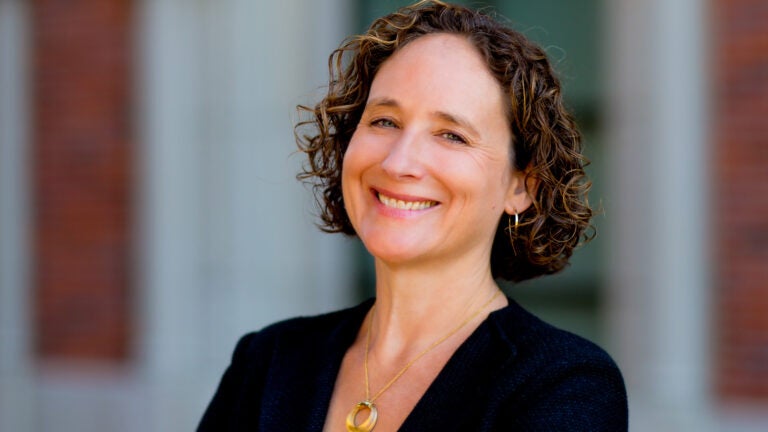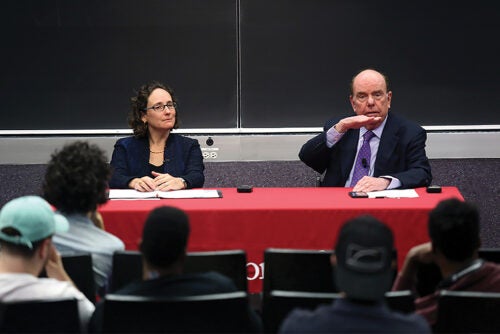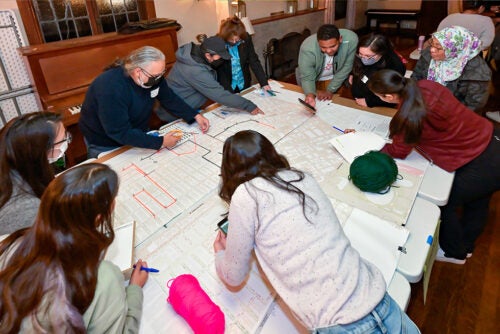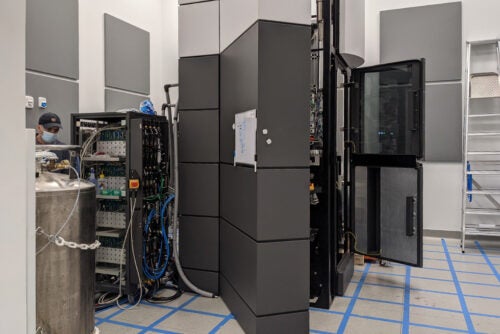
Dean Amber Miller leaves USC Dornsife with momentum for the future
When experimental astrophysicist Amber Miller was installed in 2016 as the 22nd dean of the USC Dornsife College of Letters, Arts and Sciences, she posed a question that had been on her mind for several years: How did university scholarship lose its public audience?
The reasons, she outlined, trace changing sociopolitical dynamics over several decades and an increasingly antagonistic national conversation focused not on the academic research mission but the value of a college degree. The response, Miller suggested, would not only be found in communicating more effectively; research universities must also forge stronger bonds with leaders and organizations beyond university walls and expand access to the full range of academic expertise. By becoming more responsive, Miller was convinced that these institutions — starting with USC Dornsife — could more clearly demonstrate their value and begin to renew the public’s understanding of why they matter to our collective well-being.
After nearly eight years leading USC Dornsife through some of the most challenging times in the university’s history, Miller is stepping down from her role as dean to become the next president of the William and Flora Hewlett Foundation. Moh El-Naggar, divisional dean for physical sciences and mathematics, was appointed by USC Provost Andrew T. Guzman to serve as interim dean until the search for Miller’s replacement is complete.
Miller leaves behind an institution that has made significant advancements in research and teaching during her tenure — and one that is delivering on her vision to become a go-to source for expertise.
“Amber Miller is a big-bigger-biggest ideas person who fiercely believes in primary research to shape a better future,” said USC Trustee Kathy Leventhal, who serves as chair of the USC Dornsife Board of Councilors. “She is not afraid to speak her mind, share her doubts, listen to dissenting opinions and look outside the circle, the triangle and the square for solutions to vexing problems.”
Connecting university scholarship with the public
During the first year of her administration, Miller announced the creation of “The Academy in the Public Square” (APS), a broad initiative encompassing programs that expand public engagement with leading scholars. Miller’s team, for example, forged a partnership with The Conversation, which has led to more than 14 million views of 278 articles written by USC Dornsife academic researchers on timely topics and current events. And Miller launched Dornsife Dialogues, a popular series of public, online events in which faculty provide insight on a wide range of timely subjects.

One of the most successful initiatives under the APS banner has been the USC Dornsife Center for the Political Future. Co-directed by renowned political strategists Bob Shrum, a Democrat, and Mike Murphy, a Republican, the center was launched in response to the increasingly toxic political climate in America. It brings policymakers from across the aisle together with academics, students, journalists, and civic and business leaders for rigorous and respectful debate on policy issues.
“Dean Miller is a visionary who has elevated and widened the richness of the academic experience and whose Academy in the Public Square has made USC an influential voice beyond the university’s gates on issues ranging from the climate crisis to the defense of democratic norms,” said Shrum, who serves as the Carmen H. and Louis Warschaw Chair in Practical Politics.
A new model for accessing expertise
The Academy in the Public Square was just the start of something more ambitious. Miller’s response to the question she asked at her installation was to identify a new mechanism for streamlining public access to university expertise. She recognized that the kinds of problems organizations face day-to-day are unlikely to be problems directly addressed by an academic researcher. But she was also confident that these experts could help if they applied their talent and methods to specific, relevant challenges.

Launched formally as Public Exchange in 2021, Miller established a first-of-its-kind hub for facilitating and project managing research partnerships between academics and social impact leaders working on complex problems. She recruited Kate Weber from the U.S. Agency for International Development (USAID) to lead this new entity.
Following an extensive proof-of-concept phase, Public Exchange was formally launched in 2021. It has since expanded to comprise dedicated practices in sustainability and health and well-being, while amassing a portfolio of research partnerships valued at more than $10 million. “Public Exchange’s rapid growth over the past four years is a testament to Amber Miller’s foresight, and a prime example of her leadership in crafting a university equipped to solve the problems of the 21st century,” said Weber.
More than 100 researchers across nine USC schools and seven universities have worked with Public Exchange on projects spanning water conservation, climate communication, homelessness, and clinician burnout, among others. Several collaborations have earned significant media attention, including the USC Urban Trees Initiative and a food insecurity project that began in response to the COVID-19 pandemic, both of which are collaborations with the City of Los Angeles.
Scholarship at the core
The longest-serving dean at USC Dornsife since the 1950s, Miller has been adamant that a robust research enterprise is the key to a research university’s success across the board. Under her leadership, the college saw a 33% increase in research-active faculty, substantial growth in research expenditures, and the launch of three new academic departments: Gender and Sexuality Studies, Middle East Studies, and Quantitative and Computational Biology. The Dean’s Office also provided seed-funding for 11 new centers and institutes through a faculty-led initiative that supports research teams in cross-cutting areas of academic strength and strategic opportunities identified by the USC Dornsife community.

Early in her tenure, Miller worked with faculty to identify existing strengths on which to build as well as emerging areas where USC Dornsife, with strategic investment, could leapfrog its peers. Over the following years, dozens of celebrated faculty were hired or retained in fields such as quantum information, social medicine, and environmental economics, among others that are now in high demand.
To support this growth in research capacity, Miller made the case for endowing faculty chairs in order to grow the faculty ranks and add intellectual heft to the college. Her team secured philanthropic commitments of $50 million for the Ronald and Leslie Sherwin Initiative for environmental protection — the lion’s share of which is earmarked for new faculty chairs — and a $15 million gift to name the Van Hunnick History Department, which includes a substantial endowment for hiring tenure-track faculty.
Building on school-wide efforts to expand partnerships across sectors, Miller’s team also secured industry research partnerships with biotechnology giant Amgen that brought two of the world’s most sophisticated cryo-electron microscopes to USC, and another with IBM that created the West Coast’s first IBM Quantum Information Center, positioning the university as a center of gravity for quantum computing research.
“Attracting the top scholars, both faculty and students, from around the world requires access to leading-edge technology that enables new scientific inquiry. Getting access to these incredibly expensive tools requires new partnerships with the commercial sector,” said Senior Advisor to the Dean for Research Strategy and Development Stephen Bradforth, who spearheaded the collaboration with Amgen. “We have been fortunate to forge exciting new relationships that have created opportunities for our researchers and trainees well beyond access to the technology alone.”
A common refrain in Miller’s pitch for the value of academic research is the countless innovations that are born out of foundational discoveries at universities — everything from mobile phones to cancer drugs. She also emphasizes the need to build a pipeline for new generations of researchers. While PhD programs have been under scrutiny in the media — and many leading universities are shrinking their programs — Miller countered the narrative by raising resources to grow USC Dornsife’s PhD programs. She and her team worked with departments to strengthen and expand PhD education, resulting in improvements in the rankings and placements of all core programs at the College. They also launched the first-of-its-kind PhD Academy, which brings cohorts of PhD students together across all disciplines for training in leadership principles, financial management, public speaking, communication, and other cross-cutting skills that give graduates an edge no matter what career path they follow.
A future-focused liberal arts education
While USC Dornsife undergraduate educational programs had already earned a reputation for excellence before Miller’s arrival, a number of new initiatives were created to ensure that students take full advantage of their dynamic research. She was also vocal in conveying the value of a liberal arts degree, particularly in an uncertain future, by promoting the flexibility it affords graduates in the marketplace and the enduring skill set that is cultivated across every major.
“Amber Miller’s commitment to the intellectual, academic mission as the foundation for our most important future discoveries, leaders, and creators has motivated our vision for undergraduate education for the past eight years,” said College Dean for Undergraduate Education Emily Hodgson Anderson. “Dornsife students have all benefited from her passionate belief that hope, change, and self-discovery start with learning from, and about, a diverse curriculum and world.”
Miller worked with Anderson and her predecessor in the college dean role to develop and implement “The Dornsife Idea,” a strategic plan for enhancing the College’s educational programs, which included launching the Center for Applied Learning and Life Beyond College. Given the sheer volume of opportunities for students to personalize and enhance their USC Dornsife education, there had been concerns that some of the most unique and relevant were being overlooked. The center pulls together the Office of Experiential and Applied Learning, Dornsife Career Pathways and the Dornsife Toolkit — a popular suite of practical skills courses launched under Miller — to serve as a comprehensive resource for students to get the most out of their USC Dornsife education. Admission and academic advising programs were restructured, as well, to create a first-year experience that encourages students to explore the College’s offerings broadly before committing to a major.
The quiet part out loud
As the leader of an academic community with a tremendously diverse constituency and scholarly interests, Miller has had the challenging responsibility of ensuring that many perspectives were heard and valued. But she has not been coy about a personal passion that is a driving force behind her push to bring research and expertise into the foreground. A native Californian, Miller is a champion for the natural environment and opportunities to design a more sustainable way of living.
Looking across the academic landscape, Miller found that while most top universities were exploring new scientific and technological solutions to climate change, few were asking why the plethora of innovations already available are not being leveraged to the full extent. So Miller launched a new initiative: “Sustainability: Human Factors,” engages USC Dornsife experts across fields including political science, economics, human behavior, and storytelling to work in-step with those who design technological solutions to the climate crisis.

The cornerstone of the Human Factors initiative is the USC Wrigley Institute for Environment and Sustainability, which Miller reimagined to expand its decades-long focus on marine research. In addition to supporting novel research across disciplines, it produces public-facing events including the annual Climate Forward conference (in collaboration with the Center for the Political Future) and experiential learning programs in sustainability for students from all majors. Additionally, several Public Exchange partnerships, including many of the earliest, explore ways to improve sustainability across communities.
Miller was not alone in her efforts to raise USC Dornsife’s profile as a top tier school for the liberal arts and sciences. With a commitment to increasing transparency and engaging faculty in shaping the direction of the college, Miller credits the many leaders she collaborated closely with for helping to create institutional infrastructures and frameworks in which departments, centers, institutes, and programs are able to work effectively and carve out a distinctive role in a competitive academic landscape.
“Amber Miller is an extraordinary leader who brought to Dornsife her gift for understanding the most complex, subtle and humane aspects of any difficult issue, any fraught decision,” said University Professor and Professor of English and Comparative Literature David St. John. “Her kindness to faculty and her ability to hear every anxiety at the heart of our concerns at times amazed me. She inspired a commitment to teamwork in anyone who worked with her.”
At the Hewlett Foundation, Miller will continue to bring new ways of thinking to the climate emergency, as well as to the full portfolio of Hewlett programs.
“The Hewlett presidency was just too exciting to pass up — an opportunity to work with passionate people to tackle the issues that I care about the most in new and powerful ways,” Miller said. “But leaving USC Dornsife is still hard. Our team and our community will always be a part of me, and I will miss everyone terribly.”